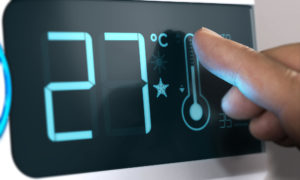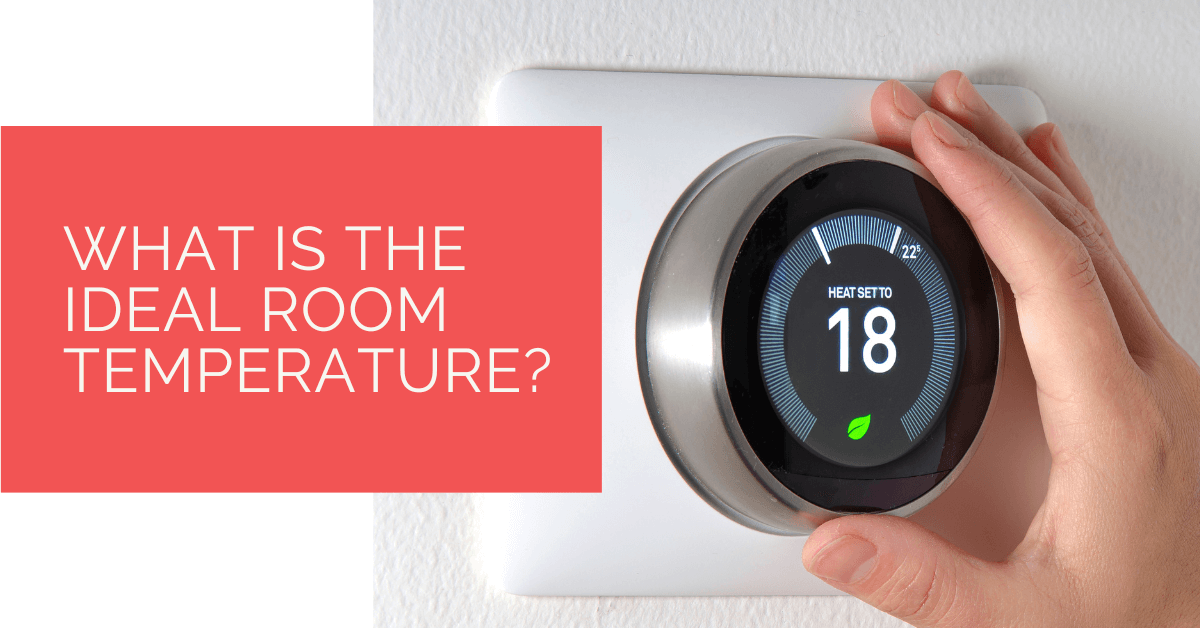The temperature of a room, as determined by a thermometer, is known as room temperature. The body may be too hot or cold to be comfortable without it. As a result, to maintain the optimal house temperature, one must rely on the thermostat most of the time.
But, while at it, how often do people struggle to figure out the ideal room temperature? Fret not; this guide will help determine the perfect temperature for any room around the house.
Contents
Key Takeaways
- The ideal room temperature varies based on location, weather, home design, and personal preferences, but in the UK, the average range is between 20°C and 24°C.
- For optimal sleep quality, it’s recommended to have a bedroom temperature between 16°C to 18°C, as the body’s temperature decreases during sleep, and temperatures above 24°C can disrupt sleep.
- Room temperatures for babies should be kept between 20°C to 22°C, while seniors and individuals with health issues should aim for 20°C to 24°C to prevent health risks associated with temperature extremes.
What Is the Adequate Room Temperature?
In a UK home, the average Celsius range is between 20°C and 24°C, ignoring specific differences and geographical variations. Maintaining that room temperature manually is a difficult task, however, with devices like a smart thermostat, this problem can be solved.
The ideal temperature would differ significantly depending on various factors, including location, weather, home design, and individual preferences.
Even though research shows the ideal degree to be 18°C, most people in the UK believe that 21°C is perfectly comfortable for them.
Home design is also an essential factor to take into consideration. For example, the perfect temperature for a bedroom, sitting room, and kitchen would be different. Another factor is the location. If rooms are located on the second floor, you want them to be colder than the ones on the first floor. This is because top portions are generally hotter than lower portions.
Let’s take a look at the different factors that determine the room temperature in depth:

Summer-friendly Room Temperature
Many UK households find it difficult to stay cool in the summer. During the season, one should aim for an ambient temperature of 17°C to 19°C.
To stop feeling so sticky, consider opening a window to increase airflow and help prevent steamy heat build-up.
Winter-friendly Room Temperature
If your home is well-insulated and free of air movement, one should aim for a room temperature of 18°C to 20°C. A study by Public Health England and supported by the world health organisation about minimum home temperature thresholds for health in winter gives further insight on staying comfortable in the UK winter months.
Ideal Sleeping Room Temperature
Most people believe that the room temperature should stay the same throughout the day. However, this is a popular misconception. While sleeping, it is better if your room is colder than it was in the morning.
The temperature of a room is fundamental to building the ideal sleeping environment, especially since sleep influences one’s health, focus, and overall wellbeing. According to the Sleep Council, your body heat rises in the evening and reaches its lowest levels while you sleep. Thus the optimal sleeping temperature for a bedroom lies between 16 °C to 18 °C.
Anything above 24 °C is just too warm.
Air conditioning settings above or below your body’s requirements can cause restlessness and disrupt sleep. The body temperature set point — what your central nervous system is attempting to achieve — decreases. As a result, when the degrees drop or are too high, the body struggles to reach the set point, and the sleep quality suffers.
Thus, the temperature during bedtime directly impacts the quality of sleep and, by extension, the quality of life. These variations in the bedroom have also been connected to insomnia.

The Best Room Temperature for Babies
It is important to provide an ideal environment for a baby. The temperature can’t be too cold or too hot since they can fall sick easily. For instance, a baby is more vulnerable to SIDS in a hot climate.
This is why a room temperature between 20°C -22°C is ideal for babies’ comfort.
Recommended Room Temperature for the Senior citizen
Much like young children, anyone above the age of 65 can fall sick easily because of small temperature changes. To prevent this from happening, a temperature between 20°C-24°C should be maintained.
Even if age isn’t considered as a factor, the temperature inside your residence should not fall below 20°C. Anything below 20°C increases the risk of respiratory illness and even hypothermia if exposed for an extended period of time. This is especially true for people who have lung or heart disease.
The Best Ways to Keep the Ideal Room Temperature
Maintaining an Ideal Room Temperature Through Automation
Smart thermostat controllers offer unparalleled HVAC control flexibility. What if someone needs to oversee the air conditioners from a distance? What if someone wants to set an intelligent comfortable temperature and humidity triggers?
Smart thermostat controllers put all these features and many more at your fingertips. A smartphone can be used to control the air conditioner. Things like preferred temperature, operating profile, and weekly schedule can be configured. This helps maintain energy bills and usage.
How Humidity Control Aids in Improving Room Conditions
Temperature and humidity are inextricably linked. A humid environment causes people to sweat and become drowsy, requiring them to adjust the setting on their air conditioner continuously. It is possible to maintain optimal temperatures by controlling humidity at around 45 per cent.

Use Zoning to Improve Temperature Control
Zoning systems help set different temperatures for different areas of the house. This way, the upper levels of the house can remain cool while the lower levels are warm. The bedroom may have a different temperature, whereas the living room and kitchen may have the same temperature.
With the help of zoning, the ideal temperature can be achieved. This way, the air condition system won’t have to work overtime to ensure your comfort no matter where you are in the house.
Make the Most of Your Room’s Windows
When sunlight enters a room through the window, it can raise the temperature and make it warmer than usual. This can be prevented by utilising window shutters or UV filters and coloured screens.
Both the amount and intensity of sunlight entering the room will be decreased.
HVAC System Maintenance and Upkeep
HVAC units that are old or faulty frequently struggle to maintain a constant temperature. This is due to various factors, the most common of which are leaking pipelines or refrigerants. The effectiveness of such systems is also low, and they use a lot of energy to maintain a constant temperature.
Positioning of Appliances in the Room
Home appliances like fridges, chillers, and computers expel heat. However, it isn’t constant. Heat is only emitted at particular times and during high usage. In such cases, an additional source of heat within the room can quickly change the room temperature. Place your appliances in rooms where an optimum temperature is not critical.
Heat Pump Source: Reliable Heating and Cooling Solutions
At Heat Pump Source, we take pride in our unwavering commitment to serving the UK with top-tier HVAC solutions. From the efficiency of heat pumps and the cool relief of air conditioning to the warmth of boilers, radiators, and underfloor heating, our dedicated team is always at the forefront of innovation. We understand the unique needs of every household and business, and we strive to provide dependable health and cooling products and services that are tailored just for you. Ensuring your comfort and satisfaction is our utmost priority. Whether you have questions, need guidance, or require support, we’re always here to assist. Please don’t hesitate to contact us; we’re eager to be of service.
In Conclusion
The ideal room temperature is a crucial aspect of maintaining comfort and well-being in your home, and it varies based on various factors, including location, weather, home design, and personal preferences. In the UK, the average recommended room temperature falls within the range of 20°C to 24°C. Still, specific situations, such as sleeping, caring for babies, or catering to the needs of seniors, may require different temperature settings.
It’s important to keep your bedroom cooler for optimal sleep quality, ideally between 16°C and 18°C, as the body’s temperature naturally decreases during sleep. Extreme temperatures above 24°C can disrupt sleep and negatively affect overall health.
Babies should be kept between 20°C and 22°C to ensure comfort and health. In comparison, senior citizens and individuals with health issues should aim for a temperature range of 20°C to 24°C to prevent health risks associated with extreme temperatures.
Maintaining the ideal room temperature can be easier using smart thermostat controllers, humidity control, zoning systems, window treatments, proper HVAC system maintenance, and careful placement of heat-emitting appliances. These strategies can help create a comfortable and energy-efficient living environment.
About the Author
At Heat Pump Source, our articles are the product of a collaborative effort among a team of highly skilled HVAC experts. Our dedicated professionals, hailing from diverse backgrounds in heating, ventilation, air conditioning, and refrigeration, contribute their extensive knowledge and experience to every piece of content. This multidisciplinary approach ensures comprehensive coverage. Our commitment is to deliver authoritative, reliable, and tailored advice to meet the unique needs of every household and business across the UK.

